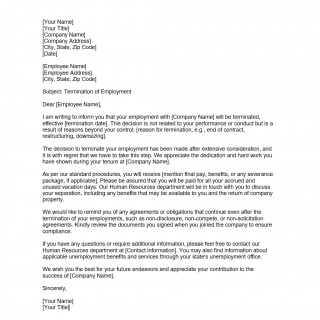Job Termination Letter
A job termination letter is a formal document used by employers to notify an employee that their employment is ending due to reasons outside of their control. This type of letter usually includes the following components:
- Header: The letter should include the company's letterhead with the name, address, and contact information at the top.
- Date: The date when the letter is written should be included.
- Employee information: This section contains the employee's name, job title, and employee ID, if applicable.
- Salutation: A formal greeting addressing the employee, typically using their first and last name.
- Body: The main content of the letter which explains the reason for the termination, final pay and benefits, and any relevant information (e.g., applying for unemployment benefits or outstanding projects that need to be completed).
- Closing: A professional closing statement, such as "Sincerely" or "Best regards," followed by the sender's signature, printed name, and job title.
The most important fields in a job termination letter are the reason for termination, the employee's final pay and benefits, and any relevant additional information. This form is compiled when an employee's employment is terminated due to reasons beyond their control, and the parties involved in the document are the employer and the employee.
When compiling a job termination letter, employers should ensure that the language used is clear, professional, and unbiased. It should adhere to company policies and any applicable laws or regulations. Details regarding final payment, unused vacation time, and other benefits should be accurately presented to minimize any potential issues or disputes.
Job termination letter sample
[Your Name]
[Your Title]
[Company Name]
[Company Address]
[City, State, Zip Code]
[Date][Employee Name]
[Employee Address]
[City, State, Zip Code]Subject: Termination of Employment
Dear [Employee Name],
I am writing to inform you that your employment with [Company Name] will be terminated, effective [termination date]. This decision is not related to your performance or conduct but is a result of reasons beyond your control: [reason for termination, e.g., end of contract, restructuring, downsizing].
The decision to terminate your employment has been made after extensive consideration, and it is with regret that we have to take this step. We appreciate the dedication and hard work you have shown during your tenure at [Company Name].
As per our standard procedures, you will receive [mention final pay, benefits, or any severance package, if applicable]. Please be assured that you will be paid for all your accrued and unused vacation days. Our Human Resources department will be in touch with you to discuss your separation, including any benefits that may be available to you and the return of company property.
We would like to remind you of any agreements or obligations that continue even after the termination of your employments, such as non-disclosure, non-compete, or non-solicitation agreements. Kindly review the documents you signed when you joined the company to ensure compliance.
If you have any questions or require additional information, please feel free to contact our Human Resources department at [Contact information]. You may also find information about applicable unemployment benefits and services through your state's unemployment office.
We wish you the best for your future endeavors and appreciate your contribution to the success of [Company Name].
Sincerely,
[Your Name]
[Your Title]
Advantages of a job termination letter include providing a formal, written record of the termination that can be beneficial for both parties in case of any disputes or during unemployment benefit applications.
Potential problems when filling out a job termination letter can include inaccurate information or language that may be perceived as discriminatory or biased, leading to potential legal issues.
Related forms include warning letters, performance improvement plans, and layoff notices. Alternative forms can include voluntary resignation letters, job abandonment letters, and dismissal letters. The main difference from analogs is the reason for termination.
The job termination letter is typically delivered in person, via email, or through postal mail. The employer should retain a copy of the letter for their records, while the employee should keep a copy for any future reference or unemployment benefit applications.

